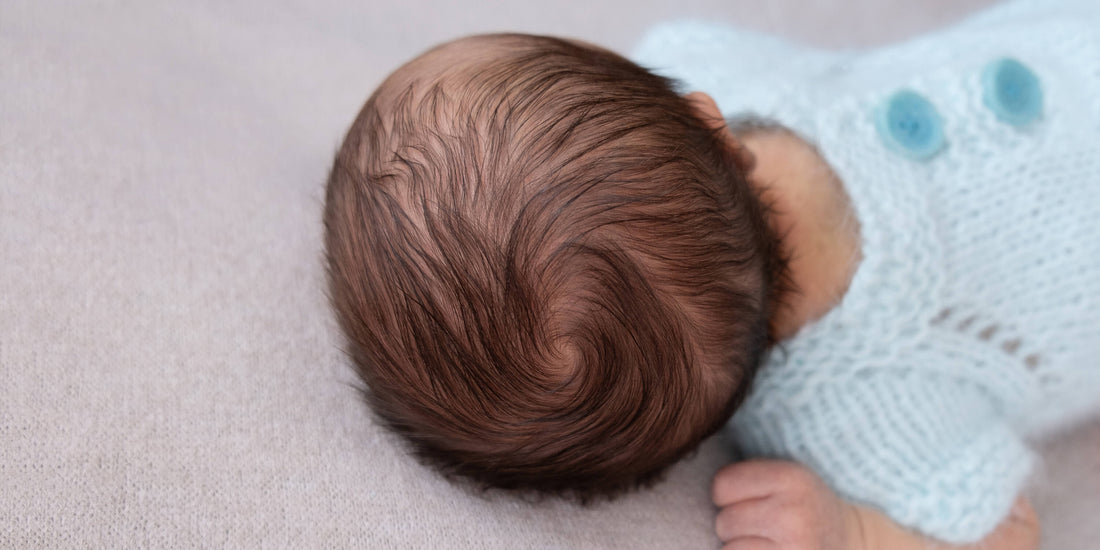5 Common Newborn Hair Care Concerns and Solutions

Baby scalp is tender and so is the hair; therefore, they require some extra tender loving care with the best oil for newborn massage. If you’re a new parent and on the lookout for solutions to your baby’s hair needs, you’re on the right page.
Firstly, you’ve to understand that your little nugget’s hair is unique. Some babies are born with a head full of hair and some with only a few wispy tresses. What works for others might not work for you. Thus, to help you navigate through hair care concerns, we’ve listed a few and the solutions. Without further ado, let’s get started
Common Newborn Hair Concerns
Due to fluctuating hormone levels, newborns lose the hair they are born with. Other factors that contribute to hair loss include hair rubbing against surfaces, fungal infections, and physical damage like tight ponytails. Here are a few common newborn hair concerns that a new parent must be aware of:
Treat Dry Scalp
Anyone can get a dry scalp, even your baby. Albeit a common scalp issue among babies, it can be linked to underlying conditions such as baby dandruff, eczema or seborrheic dermatitis. In some cases, harsh baby shampoos containing harmful chemicals like sulphates and parabens can also make the little one’s scalp drier. The possible cause of your baby’s dry scalp can be cradle cap.
Harmless and non-alarming, cradle cap is also a common cause of a baby’s dry scalp. Massaging your newbie with the best oil for newborn massage helps keep the condition under control.
Let’s discuss this in detail in the next section!
What Is Cradle Cap
Scientifically referred to as infantile seborrheic dermatitis, cradle cap is a common scalp condition among the newbies. The exact cause of this scalp condition is unknown; however, it is thought to be caused by a combination of environmental and genetic factors and the overgrowth of sebum oil underneath the skin.
New parents, if you see your baby has developed this condition, no need to worry as it is not contagious and typically resolves on its own. However, massaging your baby’s scalp with the best oil for infant massage helps loosen up the dry flakes. Using a gentle baby shampoo infused with natural ingredients like oat kernel flour, almond oil, coconut oil, and olive oil also cleanses the scalp while preventing scalp conditions like cradle cap.
Opt for a natural baby oil to massage with, which will keep your baby’s scalp healthy and nourished. Before you make a purchasing decision, make sure to check the label carefully. The best newborn massage oil will be free of harmful chemicals and toxins like parabens and phthalates.
Why Is My Baby Experiencing Hair Loss
Baby hair loss is quite common and nothing to worry about. In the first few months, newborns tend to lose their hair due to hormonal changes. It happens when hair stops growing temporarily and as your baby grows, new hair starts to grow back. Additionally, babies tend to lose hair from rubbing their heads against something like a pillow or a mattress. Changes in growth patterns also contribute to hair loss, and it’s usually a natural part of development.
Massaging your little nugget’s scalp with the best newborn massage oil offers numerous benefits. It helps stimulate the scalp and improves blood circulation to the hair follicles. Look for natural baby oils to massage with, like coconut, almond or olive oil. These natural oils provide essential nutrients that nourish and moisturize the scalp, preventing flakiness. Additionally, gentle massaging helps remove dead skin cells, promoting healthy hair growth.
Uneven Hair Growth
If you’re a new parent, you need not worry about your baby’s uneven hair growth. It is usually not a cause for concern as it is very natural. Natural growth patterns can get affected due to friction, which in turn, causes hair thinning in certain areas. Maintain a gentle hair care routine with the best oil for infant massage for a healthy scalp and balanced hair growth over time.
Tips for Using Gentle, Baby-Friendly Products
Your baby’s hair is more sensitive and delicate compared to adult hair. Products with high pH levels can be harsh on your little one’s scalp leading to dryness and irritation. Always opt for the best oil for newborn massage and the best shampoo specifically crafted for babies with gentle formulations and a pH level close to that of their skin. The best oil for newborn massage contains the goodness of natural ingredients like coconut oil, almond oil, olive oil, and ashwagandha oil. Natural oils gently moisturize the delicate scalp while preventing conditions like cradle cap.
Wrapping Up
A nourished and clean scalp keeps a lot of hair concerns at bay while promoting good hair growth in newborns. Besides keeping it well moisturized with the best oil for newborn massage, make sure to use lukewarm water while you bathe your little one, and don’t overwash. Remember, minimal grooming, natural products, and adequate hydration are key to a healthy scalp.



